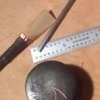lips too thin, or too closed--chop edge back or open with bridle. (Gallagher)
Chanter Reed Issues
Search Tips:
- To search for a particular note, such as "D", enter "D note" (Quotes are not required).
- To find all, reload the page or delete all search terms and click "apply".
- Back D Discussions
Back D is Weak (Chanter)
High E is Sharp (Chanter)
-
Lips too closed, or not vibrating freely enough--open with bridle or scrape more. (Gallagher)
Gurgle on Bottom "D" (Chanter)
-
Reed too short, or scraped too much. (Gallagher)
Reed is Dull-Sounding (Chanter)
-
Blade edges too thick--untie and resand on cylinder (Gallagher)
Reed requires Much Pressure to Play (Chanter)
-
Lips too open, or cane too stiff--close with bridle, may require more scraping. (Gallagher)
Hard "D" Difficult to Sound (Chanter)
-
Bottom of V needs more scraping, possibly into U-shape. (Gallagher)
Back D is Sharp (Chanter)
-
D-hole needs to be closed with tape, sanding the lips will also flatten the back D. (Gallagher)
Back D is Flat (Chanter)
-
Reed needs to be shortened--chop the edge back a bit, or insert rush to flatten notes below the back D. (Gallagher)
Second Octave is too Sharp (Chanter)
-
Staple size [internal volume, not length] needs to be reduced. (Gallagher)
Second Octave is too Flat (Chanter)
-
Staple size needs to be increased. (Gallagher)
Second Octave is Difficult to Obtain (Chanter)
-
Blades too open, too thick or too long --close with bridle or scrape more. (Gallagher)
High "B" is Difficult to Obtain (Chanter)
-
Blades too short; staple volume too small; volume of chanter from thumb-hole to throat too big for reed--try wire rush in this area or staple with larger internal volume. (Gallagher)
Unstable Back "D" (Chanter)
-
This may be caused by leakage, but is usually the result of the blades being too thin, having been brought to that point in an effort to control overall pitch. For the back D to be stable, there must be enough thickness at the very mouth of the reed to support the note. For every appropriate bore and staple combination there is an ideal head width which will yield good intonation, a stable back D, and the proper overall pitch, assuming the chanter is a well made one to begin with. The width must be determined by experimentation, rather than prescription. (Quinn)
Sinking Back "D" (Chanter)
-
If the lips of the reed are thinner than they ought to be, several problems may arise, most notably the "sinking D" and lack of responsiveness in the second octave. (Quinn)
Reed is Sharp (Chanter)
-
A reed which is too sharp may be flattened by further thinning. As the thinning continues, the reed becomes softer to blow. Opening the blades slightly by squeezing the copper bridle at its folds will also flatten the reed and make it somewhat stronger to blow. When opening the aperture with the bridle, it is best to lift gently the ends of the copper strip out away from the cane before squeezing at the folds. If you squeeze at the folds without first slightly prying out the ends, they will be forced back into the cane, placing an asymmetrical force on the reed. A reed that is sufficiently thin but still hard to blow may be softened by closing the blades slightly. Be careful, when adjusting the reed with its bridle, not to allow the edges of the blades to separate and cause leaks. (Quinn)
